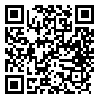Download citation:
BibTeX | RIS | EndNote | Medlars | ProCite | Reference Manager | RefWorks
Send citation to:



BibTeX | RIS | EndNote | Medlars | ProCite | Reference Manager | RefWorks
Send citation to:
Pourkarimi Havoshki M, Manzari Tavakoli V, Darzinia N, Ghonchepour M. The Mediating Role of Social Information Processing in
Relation to the Cognitive Regulation of Emotion and
Academic Vitality of Students. Iranian Journal of Medical Education 2024; 24 :20-29
URL: http://ijme.mui.ac.ir/article-1-5714-en.html
URL: http://ijme.mui.ac.ir/article-1-5714-en.html
Department of Educational Sciences, Farhangian University, Tehran, Iran. , v.manzari@cfu.ac.ir
Abstract: (1896 Views)
Introduction: Academic vitality is one of the important indicators in successful learning, which shows academic abilities and progress. This study endeavored to design a structural model to explain the mediating role of social information processing in the relationship between cognitive regulation of emotion and academic vitality in medical students of Kerman.
Methods: The research design was correlational. The population was formed by all medical students of Kerman in the academic year 2022. 230 students were selected through multi-stage random sampling method. To gather data, questionnaires of cognitive strategies of emotion regulation (CREQ), academic vitality (AVQ) and social information processing (IPRQ) were used. Descriptive statistics and Structural Equation Modeling and Amos were used for data analysis.
Results: The results of the research indicated that the cognitive strategies of emotion regulation directly and indirectly with the mediation of social information processing have a significant relationship with academic vitality. Besides, 0.61 of the effect of emotion regulation cognitive strategies on academic vitality is indirectly explained by the mediating variable of information processing (p<0.01).
Conclusion: Overall, according to the results obtained from this research, by improving the processing of social information and improving the cognitive strategies of students' emotion regulation, such as social awareness, rumination and acceptance, it is possible to set the scene for increasing their academic vitality.
Type of Study: Original research article |
Subject:
Teaching Methods
Received: 2023/11/7 | Accepted: 2024/03/4 | Published: 2024/05/30 | ePublished: 2024/05/30
Received: 2023/11/7 | Accepted: 2024/03/4 | Published: 2024/05/30 | ePublished: 2024/05/30
Send email to the article author
| Rights and permissions | |
 |
This work is licensed under a Creative Commons Attribution-NonCommercial 4.0 International License. |






